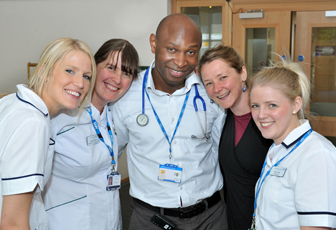Intensive Care Unit (ICU)
What we do
Our Intensive Care Unit (ICU) provides specialised monitoring and treatment for adults with life threatening conditions, 24 hours a day, seven days a week.
Our specialist skills include medical, nursing and other personnel experienced in the management of these patients.
We have 7 beds for level 3 (intensive care) and level 2 (high dependency care) patients.
Who is involved in the care of the patient?
Each patient is under the direct care of a consultant anaesthetist and a consultant of the relevant speciality. Usually, one nurse is allocated to one or two patients with a senior nurse in overall charge. Physiotherapists visit patients’ on a daily basis and treat according to the needs of the patient. Student nurses might also be allocated to work with the qualified nurses. They are always closely supervised however you are within your rights to refuse for a student nurse to be involved in your care should you wish. There may be occasions when you feel you would like to be involved in your relative's care or would like to stay with your relative during certain procedures. Please discuss this with the nurse looking after your relative and they will be able to arrange it.
Please feel free to ask questions. If you would like to speak to the consultant ask the nursing staff and they will arrange this for you. However, please note that detailed information concerning the patient will only be given to the next of kin in respect of the patient’s privacy.
What equipment will you see?
A lot of the equipment on ICU will be unfamiliar to you. The nurse at the bedside will be able to explain what it is used for. Most of the equipment on ICU has an alarm; these are very sensitive and will often make a sound, it does not necessarily mean anything is wrong so please do not be concerned by this. Below is a brief description of some of the items of equipment you may expect to see.
The Monitors
The monitors resemble computer screens and are situated behind each patient’s bed. They monitor the patient's heart rate, blood pressure, respirations rate, oxygen levels and other useful things.
Oxygen Equipment
The patient may require oxygen which can be given through a face mask or through small tubes in their nose.
Breathing Tube
To help the patient breathe they may be "intubated". This means that a breathing tube is inserted into the windpipe. The tube protrudes from the mouth and will prevent speaking whilst it is in place.
Ventilator
This is a piece of equipment that when attached to the breathing tube takes over the work of breathing for the patient. To help make the patient comfortable whilst they are ventilated, they are usually given sedatives and painkillers. These drugs may make the patient appear drowsy or asleep, but always assume they can hear you.
Naso-Gastric Tube
This is a small tube extending into the patient's stomach via the nose. This helps to prevent sickness by draining excess stomach contents away. It also enables the patient to be fed if they are unable to swallow.
Urine Catheter
In order to measure urine accurately, a small tube will be inserted into the patient's bladder and the urine will drain into a bag attached at the side of the bed.
Central Venous Catheter
This is a large intravenous line usually inserted into one of the veins in the neck or chest area to enable lots of drugs to be given simultaneously. It may sometimes be a little uncomfortable for the patient. If this is the case please let the nursing staff know and they will try to re-position the catheter to make it more comfortable.
Contact and location
Intensive Care Unit, 2nd floor of Warwick Hospital (next to Willoughby Ward)
Tel: +44 (0)1926 495321 Ex 4343
Visiting a patient
Visiting times: 12:00-19:00
On arrival please ring the bell at the ICU entrance and wait for someone to answer.
Visiting can be tiring and stressful, especially for patients, therefore please only visit for short periods. For the same reason, visitors are restricted to close family and friends and only two visitors are allowed at any one time at the bedside. There may be circumstances where these restrictions do not apply and this can be discussed with the nurse in charge.
Please check with the nursing staff before bringing food or drink for the patient. Please do not bring flowers and plants as the water can become a source of infection. Letters and cards may be sent or brought to the patient.
It is not recommended that young children visit as there are often infections around to which they may be susceptible. However, if you would like to bring a child to visit, please discuss it with the nurse in charge.
There is access for disabled visitors via the lifts and there is enough space around the beds to enable a wheelchair to fit in. there is also a disabled toilet within the ICU.
« Return to Adult in-hospital services






